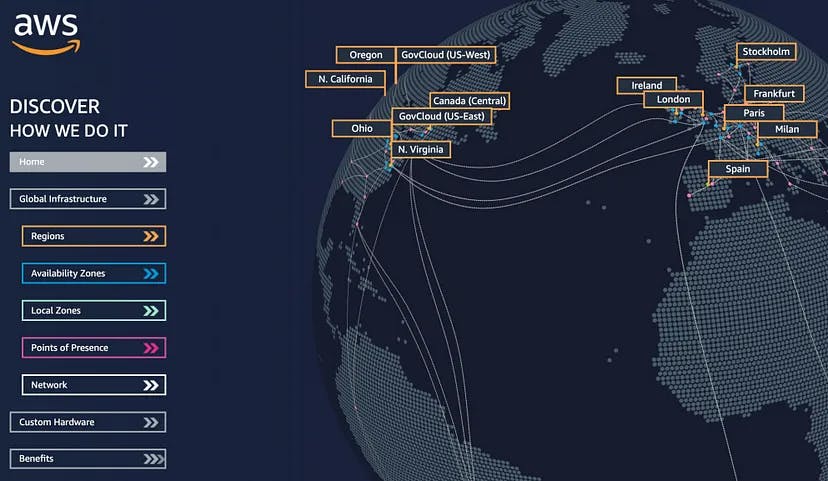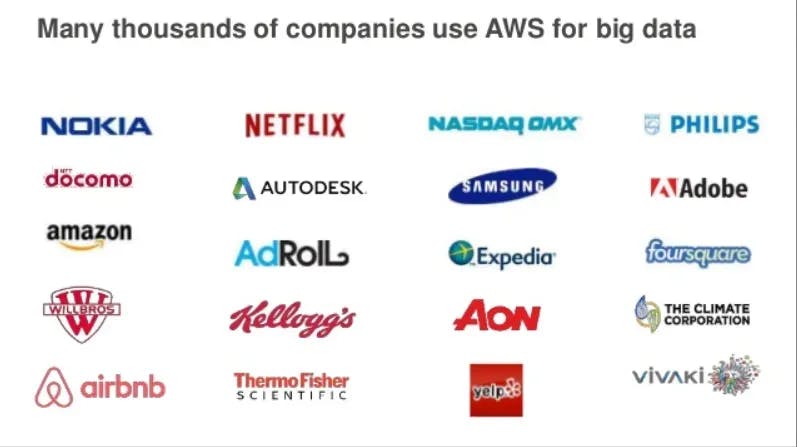what’s a Cloud Computing Platform?
Cloud Computing is the delivery of computing services — including servers, storage, databases, networking, software, analytics, and intelligence — over the internet (“the cloud”).
About AWS
Amazon Web Services, Inc. is a subsidiary of Amazon that provides on-demand cloud computing platforms and APIs to individuals, companies, and governments, on a metered, pay-as-you-go basis.
Millions of customers trust AWS to power their infrastructure and applications. Organizations of every type and size are using AWS to lower costs, become more agile, and innovate faster.
AWS provides over 200 fully featured services for a wide range of technologies and industries that can use these services to build and run virtually any type of application without upfront costs or ongoing commitments. Only pay for what you use.
AWS Regions & Availability Zones
AWS has the concept of a Region, which is a physical location around the world where we cluster data centers. We call each group of logical data centers an Availability Zone. Each AWS Region consists of a minimum of three, isolated, and physically separate AZs within a geographic area. Unlike other cloud providers, who often define a region as a single data center, the multiple AZ design of every AWS Region offers advantages for customers. Each AZ has independent power, cooling, and physical security and is connected via redundant, ultra-low-latency networks. AWS customers focused on high availability can design their applications to run in multiple AZs to achieve even greater fault-tolerance. AWS infrastructure Regions meet the highest levels of security, compliance, and data protection.
AWS provides a more extensive global footprint than any other cloud provider, and to support its global footprint and ensure customers are served across the world, AWS opens new Regions rapidly. The AWS Cloud spans 105 Availability Zones within 33 geographic regions around the world, with announced plans for 12 more Availability Zones and 4 more AWS Regions in Germany, Malaysia, New Zealand, and Thailand. For more visit the Official AWS page.

Advantages of using AWS
🔐Security:
In terms of security, AWS infrastructures are monitored 24/7 to help ensure the confidentiality, integrity, and availability of your data. All data flowing across the AWS global network that interconnects AWS data centers and Regions is automatically encrypted at the physical layer before it leaves AWS secured facilities. You can build on the most secure global infrastructure, knowing you always control your data, including the ability to encrypt it, move it, and manage retention at any time.✅Availability : AWS delivers the highest network availability of any cloud provider. Each region is fully isolated and comprised of multiple AZs, which are fully isolated partitions of AWS infrastructure. To better isolate any issues and achieve high availability, you can partition applications across multiple AZs in the same region. In addition, AWS control planes and the AWS management console are distributed across regions, and include regional API endpoints, which are designed to operate securely for at least 24 hours if isolated from the global control plane functions without requiring customers to access the region or its API endpoints via external networks during any isolation.
⏲Performance: The AWS Global Infrastructure is built for performance. AWS Regions offer low latency, low packet loss, and high overall network quality. This is achieved with a fully redundant 400 GbE fiber network backbone, often providing many terabits of capacity between Regions. AWS Local Zones and AWS Wavelength, with AWS’s telco providers, provide performance for applications that require single-digit millisecond latencies by delivering AWS infrastructure and services closer to end-users and 5G connected devices. Whatever your application needs, you can quickly spin up resources as you need them, deploying hundreds or even thousands of servers in minutes.
🎢Scalability: The AWS Global Infrastructure enables companies to be extremely flexible and take advantage of the conceptually infinite scalability of the cloud. Customers used to over provision to ensure they had enough capacity to handle their business operations at the peak level of activity. Now, they can provision the amount of resources that they actually need, knowing they can instantly scale up or down along with the needs of their business, which also reduces cost and improves the customer’s ability to meet their user’s demands. Companies can quickly spin up resources as they need them, deploying hundreds or even thousands of servers in minutes.
🔀Flexibility: The AWS Global Infrastructure gives you the flexibility of choosing how and where you want to run your workloads, and when you do you are using the same network, control plane, APIs, and AWS services. If you would like to run your applications globally you can choose from any of the AWS Regions and AZs. If you need to run your applications with single-digit millisecond latencies to mobile devices and end-users you can choose AWS Local Zones or AWS Wavelength. Or if you would like to run your applications on-premises you can choose AWS Outposts. If you are in a public sector organization or highly regulated industry, you can read AWS’s plans to launch the AWS European Sovereign Cloud.
☁️Global Footprint: AWS has the largest global infrastructure footprint of any provider, and this footprint is constantly increasing at a significant rate. When deploying your applications and workloads to the cloud, you have the flexibility in selecting a technology infrastructure that is closest to your primary target of users. You can run your workloads on the cloud that delivers the best support for the broadest set of applications, even those with the highest throughput and lowest latency requirements. And If your data lives off this planet, you can use AWS Ground Station, which provides satellite antennas in close proximity to AWS infrastructure Regions.
Companies Using AWS:
According to Amazon, the number of active AWS users exceeds 1,000,000.
While small and mid-size companies make up the majority of that user base, recent polls by private consulting firms suggest that enterprise-scale users make up at least 10% of that total.

AWS Customers List:
AWS is used by many technology giants, Banks, Food manufacturers, Governments, Television Networks, and many other different organizations to develop, deploy, and host their applications.
Here are the names that are on record publicly as using AWS:*Aon, Adobe, Airbnb, Alcatel-Lucent, AOL, Acquia, AdRoll, AEG, Alert Logic, Autodesk, Bitdefender, BMW, British Gas, Baidu, Bristol-Myers Squibb, Canon, Capital One, Channel 4, Chef, Citrix, Coinbase, Comcast, Coursera, Disney, Docker, Dow Jones, European Space Agency, ESPN, Expedia, Financial Times, FINRA, General Electric, GoSquared, Guardian News & Media, Harvard Medical School, Hearst Corporation, Hitachi, HTC, IMDb, International Centre for Radio Astronomy Research, International Civil Aviation Organization, ITV, iZettle, Johnson & Johnson, JustGiving, JWT, Kaplan, Kellogg’s, Lamborghini, Lonely Planet, Lyft, [Made.com](Made.com), McDonalds, NASA, NASDAQ OMX, National Rail Enquiries, National Trust, Netflix, News International, News UK, Nokia, Nordstrom, Novartis, Pfizer, Philips, Pinterest, Quantas, Reddit, Sage, Samsung, SAP, Schneider Electric, Scribd, Securitas Direct, Siemens, Slack, Sony, SoundCloud, Spotify, Square Enix, Tata Motors, The Weather Company, Twitch, Turner Broadcasting,Ticketmaster, Time Inc., Trainline, Ubisoft, UCAS, Unilever, US Department of State, USDA Food and Nutrition Service, UK Ministry of Justice, Vodafone Italy, WeTransfer, WIX, Xiaomi, Yelp, Zynga and Zillow.*
Conclusion:
Amazon Web Services (AWS) serves as a pivotal player in the realm of cloud computing, providing a robust platform that enables individuals and organizations to harness the power of on-demand computing services. With a global footprint, AWS offers over 200 services, allowing users to build and run applications with unmatched flexibility and scalability. The platform’s commitment to security, availability, performance, and flexibility has made it the go-to choice for millions of customers worldwide. From startups to established enterprises, AWS has proven instrumental in driving innovation, lowering costs, and enhancing agility. As businesses increasingly rely on cloud solutions, AWS stands out as a reliable and feature-rich option, empowering users to navigate the digital landscape with confidence and efficiency.
Thank you for reading until the end. Before you go:
Please consider following the writer!
Follow me on LinkedIn.